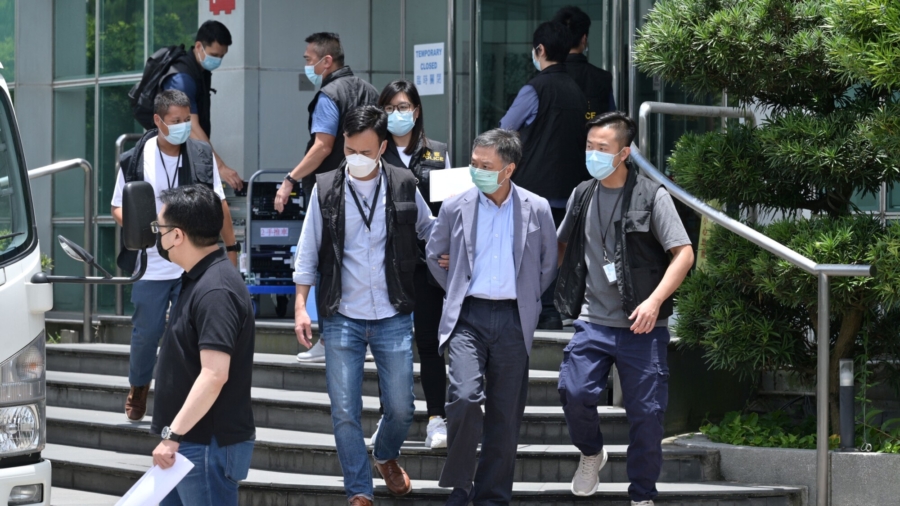International rights groups on Thursday slammed Hong Kong authorities after local police mobilized over 500 officers in a raid on the headquarters of local newspaper Apple Daily.
The raid resulted in the arrest of five directors of the newspaper under the Beijing’s draconian national security law. They were accused of violating Article 29 of the law, which bans “collusion with a foreign country or with external elements to endanger national security.“ The collusion charge carries a maximum penalty of life imprisonment.
Among those arrested were the paper’s editor-in-chief Ryan Law and associate publisher Chan Pui-man. Cheung Kim-hung and Royston Chow, chief executive officer and chief operating officer of the paper’s publishing firm Next Digital, were also arrested.
It marks the second raid at the paper’s headquarters in less than a year, after 200 Hong Kong police officers stormed the newsroom in August last year a month after the national security law went into effect.
“The arrests of five executives at the pro-democracy Apple Daily today under Hong Kong’s Orwellian National Security Law destroy any remaining fiction that Hong Kong supports freedom of the press,” Steven Butler, Asia program coordinator of the Committee to Protect Journalists (CPJ), said in a statement.
He added: “China, which controls Hong Kong, may be able to eliminate the paper, which it sees as an annoying critic, but only at a steep price to be paid by the people of Hong Kong, who had enjoyed decades of free access to information.”
CPJ condemns the arrests today of five executives at the pro-democracy Apple Daily newspaper under Hong Kong’s Orwellian National Security Law.@appledaily_hk https://t.co/yRBqYlmFYO
— Committee to Protect Journalists (@pressfreedom) June 17, 2021
The paper’s founder Jimmy Lai, who is currently in prison for his role in anti-Beijing, pro-democracy protests in 2019, is also facing allegations that he violated the national security law.
Washington-based nonprofit Hong Kong Democracy Council (HKDC) issued a statement critical of both the Chinese regime and the pro-Beijing Hong Kong government.
“Hong Kong has been left with little free speech under the NSL (national security law), which aims to silence all dissent. Today’s arrests mark yet another step toward remaking Hong Kong in Beijing’s liking,” stated Victoria Hui, a HKDC board member.
Samuel Chiu, HKDC’s managing director, pointed out how journalists in Hong Kong, including Jimmy Lai, Bao Choy, and Nabela Qoser, were being targeted for “defending freedom of the press.”
“No regime can totally suppress the truth and truth-tellers,” Chu stated.
Choy is a freelance producer with local public broadcaster Radio Television Hong Kong (RTHK), who was found guilty and fined by the Hong Kong government in April for making false statements to obtain vehicle records, which were used in her documentary examining a mob attack on commuters at a Hong Kong metro station on July 21, 2019.
Many of the metro passengers were on their way home after taking part in a mass protest against an extradition bill that would have paved the way for people in Hong Kong to be sent to mainland China if accused of a crime and tried under the communist party’s judicial system.
RTHK recently declined to renew the contract of its staff member Qoser, who is known for asking Hong Kong government officials and lawmakers tough questions.
Chris Yeung, chairperson of the Hong Kong Journalists Association, said that the raid showed that press freedom in Hong Kong has been “severely undermined” by the national security law, according to Apple Daily.
“There is zero protection of news materials,” Yeung added.
Journalism Endangers China’s National Security: HK Official
Hong Kong police arrived at the Apple Daily headquarters at around 7:30 a.m. local time and sealed off all access to the building. According to Apple Daily, police officers prevented the paper’s journalists from working at their desks and accessed reporters’ computers.
At around 8 a.m. local time, the Hong Kong government issued a press release, saying that police officers from the city’s national security department had conducted a “search operation” at the paper’s headquarters, which included seizing “journalistic materials.”
In a separate press release, the Hong Kong government said that the five directors’ residences were searched.
Meanwhile, trading in shares of Next Digital at the Hong Kong Stock Exchange was suspended.
At around 11 a.m. local time, Steve Li, superintendent of Hong Kong’s national security unit, told local media that Hong Kong authorities had frozen about $2.32 million ($18 million HKD) in assets from three companies linked to Apple Daily.
He also said that the collusion charge was in relation to over 30 articles published by Apple Daily since 2019 that sought to have foreign countries impose sanctions on China or Hong Kong, according to Li.
Before the national security law was implemented in July last year, the Hong Kong government announced that the law would not have retrospective effects. It is unclear why now the Hong Kong authorities are citing articles published before the national security law went into effect as evidence of criminal behavior.
At noon, John Lee, Hong Kong’s security secretary, held a press conference during which he accused Apple Daily executives of using journalism as a “tool to endanger” national security. Additionally, he asked that “normal journalists” keep their distance from the “criminals” at Apple Daily.
Hong Kong police ended their raid at around 1:15 p.m. local time, taking away with them computers and hard drives.
The raid on Apple Daily immediately drew concern from overseas observers. Joseph Wu, Taiwan’s foreign minister, took to Twitter to express his frustration at what the Hong Kong authorities were doing.
“Authoritarianism is waging a brutal war on @appledaily_hk, a desperately endangered symbol of freedom in #HongKong,” Wu wrote.
He added: “I’m out of words to describe my anger & sadness at witnessing this tragedy.”
From The Epoch Times


